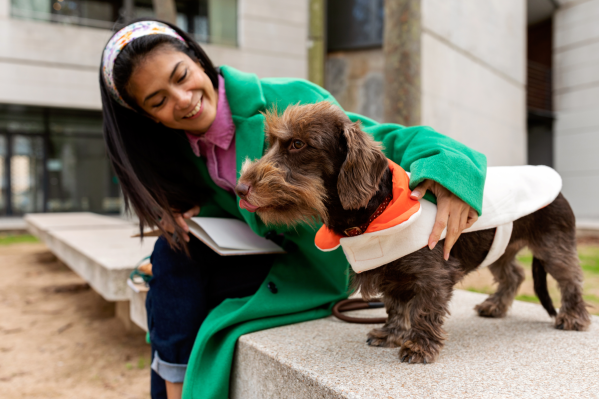While wintertime presents risks for hypothermia and other cold-weather related injuries for dogs, believe it or not, there's also a risk of your pup overheating in certain circumstances. Making sure you have the right balance of keeping your furry friend warm—but not too warm—can be tricky.
Here are some guidelines for making sure your dog stays safe and comfortable all winter long.
How to protect your dog from overheating in winter
Your dog, unsurprisingly, is most likely to overheat while indoors.
“It would be prudent to check the thermostat to make sure your home is not too warm for your pets, especially those with thick undercoats who have a higher tolerance to cold,” says Dr. Yui Shapard. “Samoyeds, Huskies, Alaskan Malamutes, Great Pyrenese, Pomeranians, Shibas, and Akitas are some examples of dog breeds that tolerate the cold very well and therefore may be more prone to overheating.”
Space heaters are also a common reason that dogs may become overheated or burned in the winter. To that end, avoid using them to warm your pup or make sure they are in a place where your dog can’t get to it. With space heaters, it’s also important that your dog can leave the area where the heater is if they get too warm. If your pup has mobility issues or is senile or geriatric, you should veer away from space heaters, as they might not have the ability or sense to move if they become too hot.
If you put clothes on your dog to keep them warm during winter months, make sure to keep an eye on them to make sure they don’t show any signs of overheating. Breeds with genetically compromised airways like Pugs, French Bulldogs, Bulldogs, and Boston Terriers are especially vulnerable to overheating issues, as they often require layers of clothes when going outside and are also prone to more complications if they become overheated.
“For these dogs, it’s prudent to monitor their breathing closely,” says Dr. Shapard. “If you notice that they are breathing more rapidly than usual, which could be hard to distinguish given that they already have abnormal breathing, or that their stertor noise—the snorting noises they make due to narrow upper airway—is more excessive than usual, it’s a good idea to adjust their layers or provide them with fresh water and rest.”
Signs your dog is overheating
If your dog is overheating, they may start panting excessively, drinking a lot of water, or seem lethargic or disoriented. They also might start vomiting or have diarrhea. If your dog has any of these signs, you should take steps immediately to cool them down.
What to do if your dog is overheating
“If you think your dog is overheating, take off any outerwear they may be wearing and allow them to calm down in a quiet place away from heat sources,” recommends Dr. Shapard.
You should also provide your dog with fresh, cool water and observe their breathing.
“Their respiratory rate would be high if they are panting,” says Dr. Shapard. “But after a few minutes of cooling down, they should resume a normal rate, which is no more than 40 breaths per minute max.”
If you’re worried your pup may be too hot, you can also check their gum and tongue color—both should be pink (unless they have pigmentation)—and if they’re pale or purple instead, it could be a sign they’re not getting enough oxygen, which is a medical emergency and a reason to head to the vet immediately. If their gums look good, however, you can also put some ice packs in a towel and place the pack in their front armpit or inner thigh for about five minutes.
“Another option is to bring them into the bathroom and douse them with lukewarm—never cold—water to slowly bring their temperature down,” says Dr. Shapard. “If after all of these attempts they are continuously breathing excessively and/or panting, it's time to give your veterinarian a call to see if further intervention needs to be made.”
While overheating is a danger in winter, the good news is that it’s relatively rare. When in doubt, it doesn’t hurt to call your veterinarian, and the experts at Pawp are also available to answer any of your questions 24/7.
